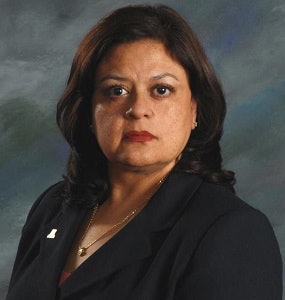Research shows demonstrations unite communities around important causes and help students learn how to advocate for change. It helps them find their voice and self-efficacy and to feel like leaders instead of victims as they engage in difficult conversations. As a critical race theorist who promotes diversity of thought and increased representation of minoritized populations in policy making positions, I have participated in my share of demonstrations across the country and believe demonstrations serve an important purpose.
 Dr. Sofia Ramos
Dr. Sofia RamosStudents across the country are doing much heavy lifting as they lead the charge to force universities to review policies and procedures through strong advocacy and demonstrations. Demonstrations were held against ICE and Border Patrol at University of Arizona, Arizona State University, Johns Hopkins, Northwestern, University of Colorado and Oregon Health Science University.
Often demonstrations come after advocacy for change is perceived to have failed. It is an escalation meant to show administrations the urgency of the situation.
Yet student demonstrators are often charged with misdemeanors and sometimes more serious charges to thwart their efforts and make them an example for others.
As students flex their intellectual muscles, their voice needs to be fostered, not quashed on campuses across the country.
For students, higher education is a time of growth, exploration and learning how to be critical thinkers and problem solvers who advocate for change. Quashing demonstrations and difficult conversations does not encourage leaders to think outside the box. It does not help young people find their voice or encourage them to be much needed change agents and transformational leaders.
Recent campus demonstrations across the country over controversial speakers, DACA, immigration policies, border patrol presence on campus and removal of Confederate monuments are examples of important issues requiring constructive dialogue and thought leadership.
We know engaging in critical thinking helps students grow into thought leaders better able to tackle challenges. Students must be encouraged to use their voice and advocate for change with support from faculty and administrations ready to listen and be part of the solution finding process.
It is important to consider that, higher education institutions are by design, self-preserving, with culture and practices passed down for hundreds of years meant to keep things moving in the same direction. But minoritized populations understand the need for change and their leadership style puts them at odds with the institution.
Minoritized population’s motivation is not necessarily maintaining institutional status quo. They are more focused on bringing innovation and change to the institution. Most importantly, they understand the need to address issues related to access, inequity, lack of diverse representation and inclusivity on campus. They are focused on providing effective authentic, transformational and disruptive leadership.
Minoritized populations favor authentic leadership because their communities expect them to be true to their culture and traditions. Their lived experiences provide a depth of understanding that compels them to want change. Strong family connections and expectations for high values and moral actions guide their need to be change agents, to speak the truth and work for change. They come armed with the knowledge that the prosperity and success of their communities depends on them.
They also favor transformational leadership that works for change in individuals and social systems and helps advance our society to a higher level of morale and motivation. Minoritized populations favor transformational leadership because they are ready to move the institution into higher levels of moral behavior around social issues. They are ready to engage the institution in conversations and positive actions around equity and inclusivity for people of color, disabled, LGBTQ and veterans.
Minoritized populations favor disruptive leadership because they see a need for disruption of status quo in higher education. Their personal lived experiences are invaluable in informing change for institutions developed using Anglo-male normed models of education hundreds of old. Disruptive leaders look for ways to improve the institution for everyone and are not afraid to ruffle feathers to effect positive change.
Unfortunately, the idealism of transformational and disruptive leadership often puts students, faculty and administrator who are change agents at odds with institution not ready to change.
Institutions favor transactional leadership that promotes maintaining status quo and favors strict policies, procedures and rules. Transactional leadership is preferred by organizations cemented in tradition, reluctant to change. While it is not always in their best interest, institutions often reward following the rules and achieving stated goals, not creative or innovative thinkers.
Progress is born out of calls for change, intentional listening, mindful reflection and a willingness to think outside the box in search of positive change. Minoritized populations’ disruptive leadership styles including student demonstrations are a pathway for positive change.
Waiting for issues to bubble into demonstrations, heated discussions and deteriorating trust hurts everyone. Fostering change agents and disruptive leaderships helps build trust. It includes creating mechanisms to listen to concerns and proposals for positive change.
Now more than ever, the challenges faced by minoritized communities call for proactive, authentic leadership and action before tensions are high and demonstrations follow. Key proactive steps needed include: 1) Promote and honor student advocacy; 2) Develop mechanisms for students to provide their voice to administration; 3) Provide Action Research training for student activists to advocate armed with data and full understanding of pros and cons of issues; 4) Mentor and encourage students to develop and present feasible proposals for change to executive leadership team; 5) Develop executive teams ready for innovation and change.
As tensions flare, let’s honor those student activists who put their own comfort and safety behind their need for change. Let’s foster environments that facilitate our collective need for progress and innovation instead of one that suffocates ingenuity for safety, continuity and maintaining the status quo. These young leaders and demonstrators are our future, we must respect them, mentor them and foster their development.
Dr. Sofia Ramos is president of Luminario Education Strategies is an education, career and leadership consultant with over twenty years of higher education experience.















